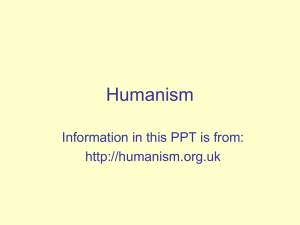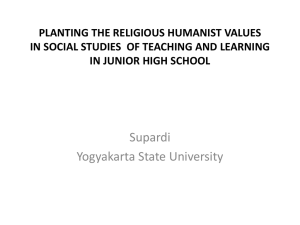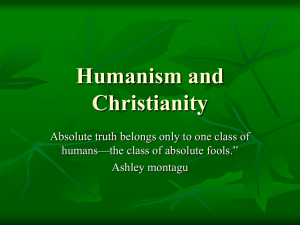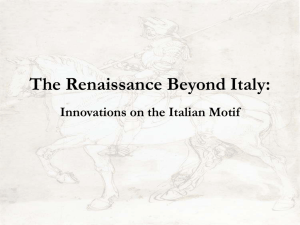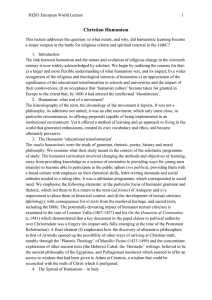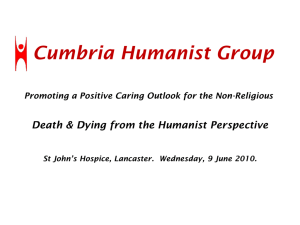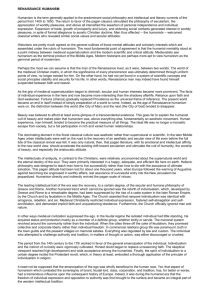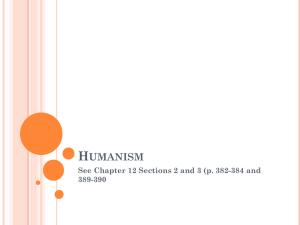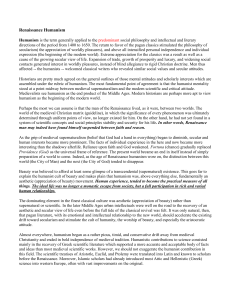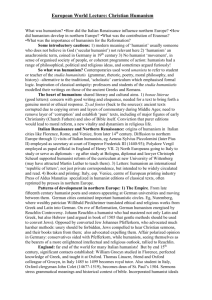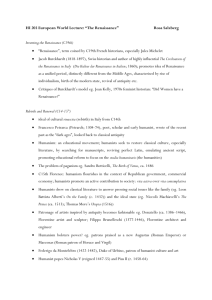Convicting Those Who Contradict
advertisement
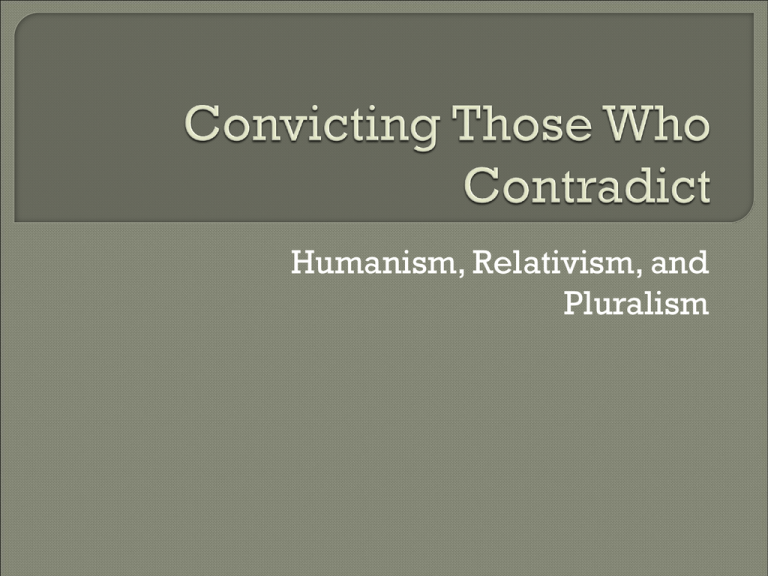
Humanism, Relativism, and Pluralism Humanism is a religion Main tenets of humanism • Atheism • Evolution • Relativism • Autonomy of man These ideas are laid out in “The Humanist Manifestos”, I, II, and III From The Humanist Manifestos • “Religious humanists regard the universe as self- existing and not created” • “As in 1933, humanists still believe that traditional theism, especially faith in the prayerhearing God, assumed to live and care for persons, to hear and understand their prayers, and to be able to do something about them, is an unproved and outmoded faith.” • “As nontheists, we begin with humans not God, nature not deity.” • “Humans are an integral part of nature, the result of unguided evolutionary change.” Tolerant of everything but theism! From The Humanist Manifesto I • “Humanism asserts that the nature of the universe depicted by modern science makes unacceptable any supernatural or cosmic guarantees of human values.” From The Humanist Manifesto II • “We affirm that moral values derive their source from human experience. Ethics is autonomous and situational needing no theological or ideological sanction.” From the Humanist Manifesto III • “Ethical values are derived from human need and interest as tested by experience” From II • “In the area of sexuality, we believe that intolerant • • • • attitudes, often cultivated by orthodox religions and puritanical cultures, unduly repress sexual conduct. The right to birth control, abortion, and divorce should be recognized.” “The many varieties of sexual exploration should not in themselves be considered ‘evil.’” “…a civilized society should be a tolerant one.” “Moral education for children and adults is an important way of developing awareness and sexual maturity.” [Civil liberty] also includes a recognition of an individual's right to die with dignity, euthanasia, and the right to suicide. From The Humanist Manifesto I • “Religious Humanism considers the complete realization of human personality to be the end of man's life and seeks its development and fulfillment in the here and now.” From The Humanist Manifesto II • “We believe in maximum individual autonomy consonant with social responsibility.” • “There is no credible evidence that life survives the death of the body” From The Humanist Manifesto III • “Life's fulfillment emerges from individual participation in the service of humane ideals.” How did humans come to be? • Charles Darwin gave a humanist answer to this question – Evolution How have nations risen and fallen without God? • Karl Marx gave a humanist answer to this question – Marxism and class struggles How do we explain the obvious conflict in humans between the physical and spiritual? • Sigmund Freud gave a humanist answer to this question with the conscious and unconscious From The Humanist Manifesto I • “Religious humanism maintains that all associations and institutions exist for the fulfillment of human life. The intelligent evaluation, transformation, control, and direction of such associations and institutions with a view to the enhancement of human life is the purpose and program of humanism. Certainly religious institutions, their ritualistic forms, ecclesiastical methods, and communal activities must be reconstituted as rapidly as experience allows, in order to function effectively in the modern world.” (emphasis mine, edp) In other words, humanism wants to infiltrate and change all religious institutions to be more humanist Do not be deceived, YOU and I have been affected by humanism Humanism’s tentacles have reached to practically every facet of American society • • • • Entertainment Government Education (higher and lower!!!) Religion From II • “Free thought, atheism, agnosticism, skepticism, deism, rationalism, ethical culture, and liberal religion all claim to be heir to the humanist tradition. Humanism traces its roots from ancient China, classical Greece and Rome, through the Renaissance and the Enlightenment, to the scientific revolution of the modern world.” Many humanists will fall into the category described in Romans 1:18-32; 2 Tim. 3:1-9; and 2 Thes. 2:9-12 Do not judge, sow the seed! Here are some approaches to the plausibility of God (From Piloting the Strait by Dave Miller) • • • • Cosmological proof Teleological proof (design demands designer) Moral proof Evidence for the inspiration of the Bible The existence of the universe is itself proof of a creator The universe is not eternal and is degrading The “Big Bang” does not account for matter being created from nothing There had to have been an uncaused First Cause Intelligent planning is behind all ordered design Nature is meticulously designed, and that requires a Designer, an Intelligent Planner Psalm 19:1 and Rom. 1:20 capture this thought Consider the design of the human body That there exist such things as ethics and morality suggest the existence of God That human life is intrinsically valuable is evidence of the Creator Moral decline historically precedes societal fall The existence of a conscience suggests a creator. The inerrancy of the Bible; it is free from contradictions The historical and geographical accuracy • One popular example is that of the Hittites The predictive prophecies • Christ was to appear during the Roman Empire (Dan. 2:44) • The rejection and crucifixion are prophesied in amazing detail (Psalm 22, Isaiah 53) The unity of the Bible More practical for us is to work to convert the deceived humanist How do we deal with one who does not know how much humanism has influenced him? • Educate them on the origins of the tolerant, permissive attitude of our society • Then, help them to see the fact that absolute truth does exist The only certainty is that there is no certainty “Keep an open mind” “Don’t be judgmental” Avoid labeling anyone as “wrong” “I’m okay, you’re okay” All of these attitudes foster blind tolerance for beliefs and practices that are not Biblical The humanists have worked their way into the faculty of most every college and university in America This has trickled into the “religious seminaries” Examples of their influence on religion • Explaining away Bible miracles • Attacking the idea of specific verbal inspiration of the Bible (the “new” hermeneutic) • Lengthening the “days” of Genesis 1 • Separating fellowship from doctrinal correctness Relativism is a self defeating philosophy! It is inherently contradictory! Does relativism apply to natural law? Are there absolute truths in nature? Relativism completely undermines all morality If everyone is right, then no one is! Where does relativism lead? (Gen. 19:9) John 8:32, “You shall know the truth” Matt. 4:4, “…by every word…” Matt. 9:13 -> Hos. 6:6 John 7:17 John 6:45 2 Tim. 2:15 2 Thes. 5:21 2 Cor. 4:2 Acts 20:30 2 Pet. 3:16
